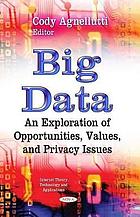"Big Data processes codify the past. They do not invent the future. Doing that requires moral imagination, and that's something only humans can provide. We have to explicitly embed better values into our algorithms, creating Big Data models that follow our ethical lead. Sometimes that will mean putting fairness ahead of profit." (p. 204)
Off-campus users will be prompted to log in to read these books using their myStevens username and password.
 Big Data: An Exploration of Opportunities, Values, and Privacy Issues
by
Cody Agnellutti
Big Data: An Exploration of Opportunities, Values, and Privacy Issues
by
Cody Agnellutti
“Algorithms are only going to become more ubiquitous in the coming years. We must demand that systems that hold algorithms accountable become ubiquitous as well” (p. 231).
The AI4People group (linked below), in surveying AI opportunities and risks (see image), developed the following principles based on traditional bioethics principles (1-4) and adding one:

"Overview of the four core opportunities offered by AI, four corresponding risks, and the opportunity cost of underusing AI", Floridi et al., 2018 (see link below)
